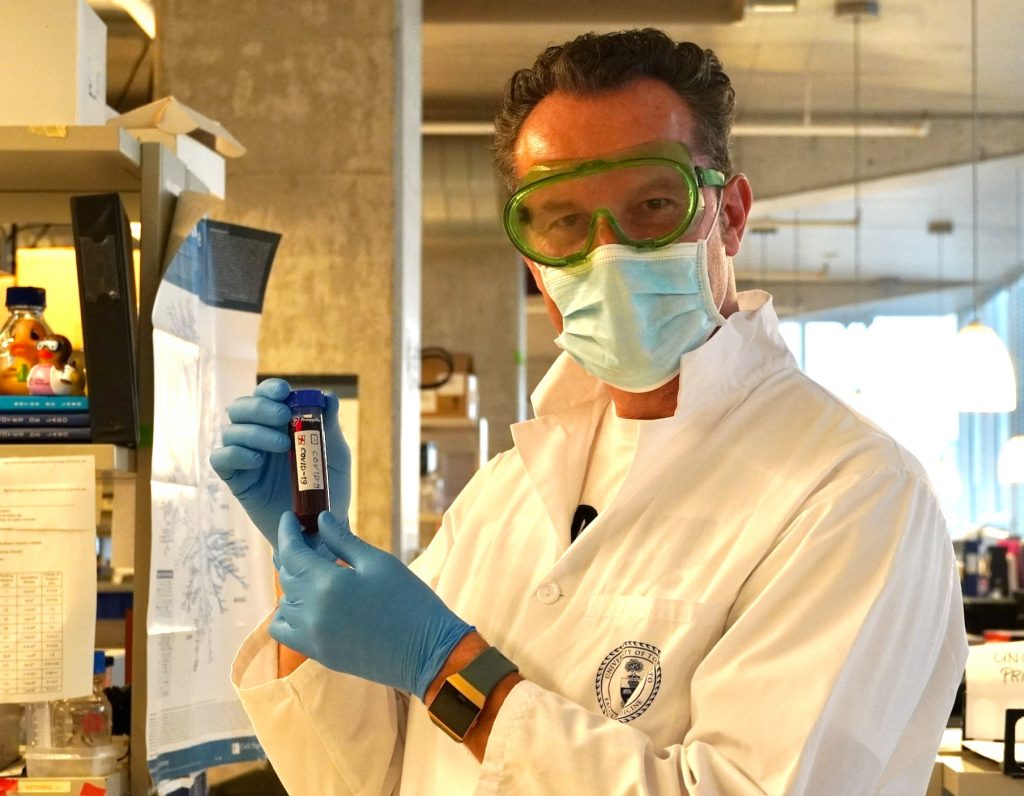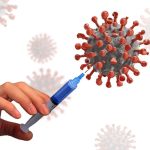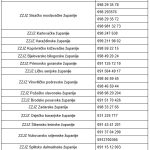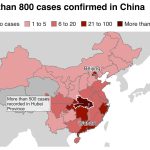24 Sata reports that given the name SATiN, professor Štagljar says that the test will very quickly and accurately, at minimal cost, monitor the antibody levels in the blood of people who have been vaccinated with some of the already-approved vaccines, all to keep the pandemic under control until we reach collective immunity by vaccinating around 70% of the world’s population.
The Štagljar Laboratory at the University of Toronto School of Medicine houses 13 young scientists from China, Iran, Montenegro, Bosnia and Herzegovina, Croatia, Russia, Romania, South Korea, Sri Lanka, and Canada. Most of them began their scientific journey in their own respective homelands and later sought their place under the sun here, with Štagljar, a professor and director at the Department of Biochemistry and Medical Genetics at the University of Toronto School Medicine. Štagljar has dedicated his career so far to the study of cancer, with a particular emphasis placed on lung cancer. However, back in January last year, when the pandemic began, his team began studying the new SARS-CoV-2 virus.
Dr. Zhong Yao, the first author of a serological test who was published recently in the well-known journal Nature Communications is one of Štagljar’s closest associates, and a native of Wuhan. In mid-January last year, Dr. Yao returned to Toronto after a month spent with his parents in his hometown. He told Štagljar about a highly contagious virus that causes respiratory symptoms in patients, which his colleagues, doctors from Wuhan, isolated. In contrast, the genomic sequence of the virus was published in a few days. Dr. Yao and part of Štagljar’s lab immediately began working on a test to detect antibodies directly from the blood of people who had previously been infected with the new virus.
“I was worried about the situation in Wuhan at the beginning because my parents are there. However, I was not so afraid because I am a researcher of medical sciences. There are two reasons why the pandemic in China has remained under control – the government has taken strong action, and people are taking it seriously and following the rules,” says Dr. Yao, who is also a member of Štagljar’s immediate team that worked on the test.
Everyone is very proud of their work and that it will serve to curb the pandemic. About twenty approved serological tests on the market detect antibodies to the coronavirus, but SATiN, Štagljar explained, does it much faster. Namely, it takes less than an hour and just a drop of blood to detect if there are antibodies and how many. Standard testing also takes much longer, about six hours, and is more expensive. The average price of the SATiN test is $2, while others on the market cost $25 dollars.
It will help detect the duration of immunity to the coronavirus in patients who have had different experiences with COVID-19, from asymptomatic to severe. In addition, it will potentially reveal what threshold antibody levels are needed for protection after natural infection and vaccination. It took this test development team only seven months. Their invention, they say, will play a vital role in relaxing economic measures and keeping the pandemic under control because it quickly and accurately reveals which part of the population in a particular country has already been infected. According to Štagljar, the test has been protected by a patent (owned by the University of Toronto, Dr. Yao, and Štagljar,) and it is already being applied to a sample of 10,000 residents of the province of Ontario (capital Toronto), which has 14.5 million inhabitants.
They will get a representative picture of the exact number of those who are immune to SARS-CoV-2. In another large epidemiological study, their test measured the number of antibodies (so-called IgG groups) after vaccination with some of the three currently approved vaccines in Canada – Pfizer, Modern, and AstraZeneca. Finally, they are working on an interesting study that uses the SATiN test to try to prove the presence of antibodies against the SARS-CoV-2 coronavirus in breast milk once vaccinated.
In simplified terms, SATiN is the first serological test for COVID-19 that ‘shines.’ It uses luciferase protein, which emits light, and the flash of light generated in the test detects antibody levels.
“It’s nice that the idea turned out to be something real. I am proud to have done something to fight the pandemic,” said Dr. Yao briefly and modestly when asked what this achievement means to him. His scientific path is quite standard – he completed his undergraduate studies in China and his postgraduate studies in Israel. After postdoctoral research, he worked as a scientist and is currently a senior research associate at the University of Toronto. Before immigrating to Canada, he contacted Štagljar, who offered him a place in Toronto. When asked if and how scientific work in China and Canada differs, Dr. Yao only briefly answered that “there are some differences.”
Štagljar’s laboratory is nice because Igor is a great leader who gave him the freedom to develop his various ideas, Yao concluded.
Dr. Yao added that life in China has returned to normal – they record only sporadic imported cases of infection. Restaurants work, life goes on, but people are still very careful. Many still wear masks, and older people avoid crowds. The majority of the population is ready to be vaccinated, concluded Dr. Yao.
Jelena Tomić is another member of the team that worked on the test. Tomić was born in Sarajevo, from which the family emigrated to Canada during the war in 1992 when Jelena was only 12 years old. She says that she did most of her adult schooling in Canada. Little by little, every shift in her career has led her to this lab, where she is delighted. Štagljar is an extremely cheerful and encouraging, optimistic boss, who appreciates hard work, Jelena said. This serological test can change the “pandemic game” for only two dollars per sample. Its modularity will allow clinical laboratories to monitor the level of antibodies to any (viral) infection, she added.
Jelena is a multi-award-winning scientist in molecular biology and genetics, but she is also involved in humanitarian work, helping with projects aimed at finding homes for the homeless.
Farzaneh Aboualizadeh is a research technician at Štagljar’s lab, an Iranian woman who arrived in Canada seven years ago. She graduated in biology in Iran and then moved to India, where she earned a master’s degree in biotechnology. She worked at home at the University of Medical Sciences, and first volunteered in Štagljar’s lab. She has been employed there for the last three years. As an immigrant, she admits, it was not easy to start a new life in a different world.
“I believe that it is different everywhere and that each side of the world has its advantages and disadvantages. But I now sincerely enjoy my job and this team. I always felt at home there,” said Aboualizadeh. Štagljar is an excellent supervisor but also a friend.
“It is a great honor to be a part of this amazing project at this difficult time. I feel that as a scientist, I have returned something to society,” she concluded.
Jamie Snider is a senior research associate in the lab, a Canadian who has worked there for 13 years. He is very interested in studying cellular function at the molecular level so that we can better understand and treat diseases. While completing his graduate studies, he recalled hearing about an interesting job with Štagljar and was lucky enough to join his team shortly after his doctorate. He works on a wide range of projects that also address drug discovery and mapping important interactions within cells that give us a better understanding of their work. Most of his research, he adds, involves developing and applying new technologies, which is particularly exciting to him.
“I am happy to have had the opportunity to participate in helping Zhong and Igor, and with the rest of the team, make this test real. I think this is a fantastic new technology that will make a big difference in the fight against the pandemic,” concluded Jamie. The team also includes Luka Drecun, who completed a specialist program in Immunology at the University of Toronto and continued his molecular genetics education. He was a passionate basketball player in high school in Canada and a proud fan of the Montenegro football club Lovćen.
The test is already available worldwide, including in Croatia, if the country wants to apply for it, Štagljar said about it coming to the Croatian market. He adds that it does not depend on him but the responsible institutions in Croatia. Štagljar closely monitors what is happening in Croatia and writes about what information is released to the public. He was extremely active on this issue on Facebook but has not commented on current events about the pandemic for the last three months.
“I simply gave up rolling in the ‘Croatian pandemic mud.’ In short, I realized that arguing with dissidents takes a lot of time and does not bring any benefit, so I completely turned to science, related to my laboratory at the University of Toronto,” concludes the scientist, whose SATiN test has been highlighted in the Canadian media.
Štagljar does not believe in the calculations according to which 25 to 40 percent of the population in Croatia has contracted the coronavirus. Impossible, because less than two percent of survivors have been proven in Canada, and these are cities with millions of people, such as Toronto.
“Unfortunately, self-proclaimed experts have appeared in Croatia who provide people, desperate because of the situation, with the information that these people want to hear, but they often have nothing to do with reality. It is not science but populism, for which there is no place in science. It is not at all easy to become a scientist, much less successful in the world. When you become that, you have no urge to talk about it on social networks, but your work speaks for you,” concluded Štagljar.
For the latest travel updates and COVID-19 news from Croatia, CLICK HERE.











